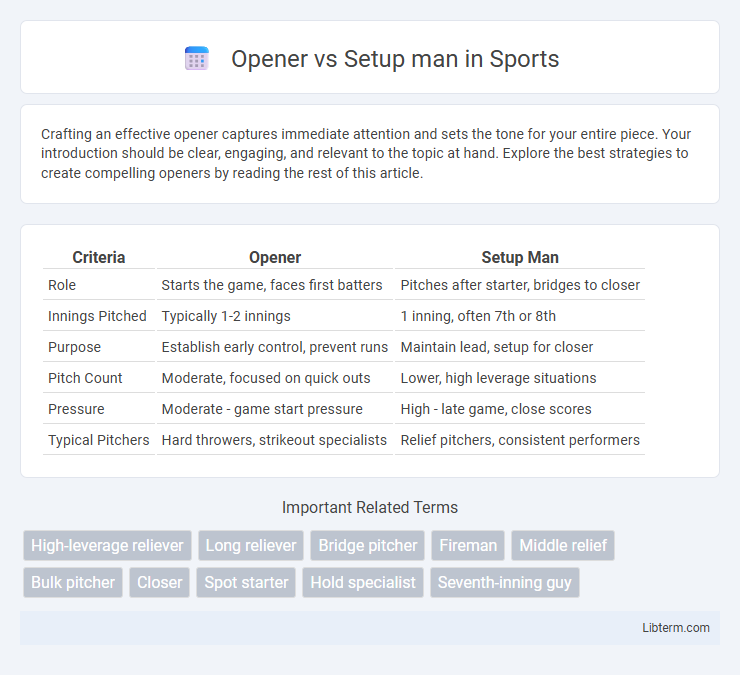Crafting an effective opener captures immediate attention and sets the tone for your entire piece. Your introduction should be clear, engaging, and relevant to the topic at hand. Explore the best strategies to create compelling openers by reading the rest of this article.
Table of Comparison
| Criteria | Opener | Setup Man |
|---|---|---|
| Role | Starts the game, faces first batters | Pitches after starter, bridges to closer |
| Innings Pitched | Typically 1-2 innings | 1 inning, often 7th or 8th |
| Purpose | Establish early control, prevent runs | Maintain lead, setup for closer |
| Pitch Count | Moderate, focused on quick outs | Lower, high leverage situations |
| Pressure | Moderate - game start pressure | High - late game, close scores |
| Typical Pitchers | Hard throwers, strikeout specialists | Relief pitchers, consistent performers |
Understanding the Roles: Opener vs Setup Man
The opener initiates the interaction by establishing rapport and qualifying prospects, ensuring a smooth transition into the sales process. The setup man is responsible for gathering detailed information, scheduling appointments, and preparing leads for the closing stage. Both roles are critical in sales teams, optimizing lead conversion by dividing tasks between initial engagement and detailed lead management.
Key Responsibilities of an Opener
An opener's key responsibilities include starting daily operations by preparing the workspace, unlocking facilities, and ensuring equipment is functional for the shift ahead. They are tasked with setting up product displays, managing initial inventory checks, and briefing the team on daily goals and priorities. These duties ensure a smooth transition into business hours and establish a productive environment for both employees and customers.
Key Duties of a Setup Man
A Setup Man is responsible for preparing and adjusting machinery to ensure optimal production efficiency and product quality. Their key duties include calibrating equipment, troubleshooting mechanical issues, and performing routine maintenance to minimize downtime. Unlike an Opener, who starts the production line and conducts initial machine setups, the Setup Man focuses on fine-tuning processes and maintaining continuous machine performance throughout shifts.
Importance in Team Strategy
Opener and Setup men play pivotal roles in team strategy by establishing early momentum and providing crucial scoring opportunities respectively. The Opener's ability to score quickly impacts pressure dynamics on the opposition, setting the tone for the innings. Meanwhile, the Setup man strategically accelerates the innings, building partnerships that solidify the team's position, making their collaboration essential for overall match success.
Skill Sets Required for Each Role
Opener roles demand strong skills in cold calling, prospecting, and initiating client relationships with effective communication and objection handling. Setup men require expertise in CRM management, detailed note-taking, and smooth transitioning of leads to closers, emphasizing organizational skills and client qualification. Both roles benefit from adaptability and customer-centric approaches but differ primarily in sales initiation versus lead management competencies.
Historical Evolution of Both Positions
The roles of opener and setup man in baseball have evolved significantly since the early 20th century, reflecting changes in pitching strategies and bullpen management. Early pitching rotations featured starters completing games, but by the 1950s, the emergence of specialized relief roles led to the setup man becoming crucial in bridging starters to closers, primarily in the seventh and eighth innings. The opener, a modern innovation popularized in the late 2010s, redefined bullpen usage by starting games with a reliever to face top batters early, reshaping traditional pitching roles and emphasizing matchup-based deployments.
Famous Openers and Setup Men in History
Famous openers like Sir Donald Bradman and Chris Gayle revolutionized cricket with aggressive batting styles that provided rapid scoring and momentum. Renowned setup men such as Rahul Dravid and Kane Williamson excelled in building innings through patience and strategic shot selection, ensuring team stability. The distinct roles highlight the balance between explosive starts and calculated progression in historical cricket strategy.
Performance Metrics and Analytics
Opener and Setup man roles differ significantly in performance metrics, with Openers primarily evaluated on early offensive impact such as strike rate and economy, while Setup men are analyzed for their ability to maintain momentum through consistency and pressure building via dot balls and wickets during middle overs. Analytics highlight that Openers often face new ball conditions requiring aggressive scoring combined with wicket preservation, whereas Setup men specialize in controlling run flow and setting strategic traps for middle and lower-order batsmen. Advanced metrics like Expected Runs Added (ERA) and dot ball percentage are crucial in distinguishing effectiveness between these roles.
Challenges Faced by Openers and Setup Men
Openers face the challenge of quickly establishing rhythm against fresh bowlers and unpredictable pitch conditions, requiring sharp reflexes and strategic shot selection to minimize early wickets. Setup men encounter the difficulty of adapting field placements and bowling plans in response to evolving batsmen techniques and pitch behavior, demanding keen observation and tactical flexibility. Both roles require continuous adjustment under pressure to influence the game's momentum effectively.
Choosing the Right Role: Team Decision Factors
Choosing between an Opener and a Setup Man depends on the team's specific pitching strategy and game context, emphasizing roles such as innings pitched and matchups against opposing hitters. Teams prioritize factors like pitch count limits, bullpen depth, and the ability to handle high-leverage situations when selecting the optimal role. Data on opponent lineup tendencies and pitcher performance metrics also guide managers in deciding whether to implement an Opener or rely on a traditional Setup Man.
Opener Infographic

 libterm.com
libterm.com